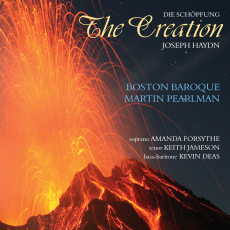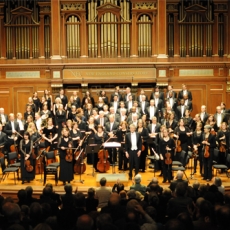Boston Baroque - Haydn Creation - Opera News
Composed to a text adapted by Gottfried von Swieten from Genesis and Paradise Lost, Franz Josef Haydn's oratorio Die Schöpfung (1798) remains one of the most popular works of the Classical era. The piece's exalted status is entirely understandable, for in no genre of art has the Creation story ever been retold with greater beauty or interpretive imagination. The sheer positiveness of Haydn's vision guarantees a unique uplift in any outstanding performance, which this new recording certainly is, both orchestrally and vocally.
A noble sense of drama colors Martin Pearlman's reading, along with a constant - and exhilarating - sense of the sheer wonder of nature as each great event of creation occurs. Pearlman expertly gauges Haydn's frequent, all-important changes of mood within individual musical numbers as well as recitativi accompagnati, making as deep an impression through intimacy as through grandeur. The Boston Baroque players achieve superb clarity of texture, performing with exceptional technical adroitness. Even listeners who associate this piece with, say, the Berlin Philharmonic under Karajan will not miss modern instruments when experiencing Pearlman's performance.
My first test for any chorus singing Die Schöpfung is ‘Und eine neue Welt,' to which Pearlman's choristers bring exactly the right buoyancy. That quality illuminates their entire performance, as does the marvellously clear textual delivery they are able to maintain at any tempo or dynamic level. The sound is beautifully balanced, and Haydn's livelier choral episodes showcase the ensemble's terrific flexibility. Their power at full strength seems astonishing, considering that this chorus numbers only twenty-five singers.
From start to finish the three vocal soloists, Americans all, project the oratorio's original German text with clarity and point. Each singer phrases the vocal line with unfettered elegance - for example, Amanda Forsythe in Gabriel's ‘Auf starkem Fittiche,' which, for sheer polish and grace, is definitely in the Popp/Bonney/Donath class. It's gratifying to hear Forsythe - who also sings a delectably feminine Eve - displaying such a thorough command of technical niceties (including effortless trills and pristine fioritura), plus a warmth of timbre atypical of most light lyric sopranos.
Keith Jameson's Uriel exhibits a combination of bright tone and sweetness that enlivens his every utterance. Particularly memorable is the opening of Part Three, in which the tenor's first lines of recitative - following Haydn's gentle orchestral introduction - are shaped with the utmost sensitivity. Bass Kevin Deas boasts wonderfully even tone through a wide range. As Gabriel he contributes a fine solemnity to the trio toward the end of Part Two. His Adam launches the lengthy duet with Eve sculpting legato phrases of ideal spaciousness.
The recorded sound adds significantly to this release's pleasures, as does Pearlman's program note.

